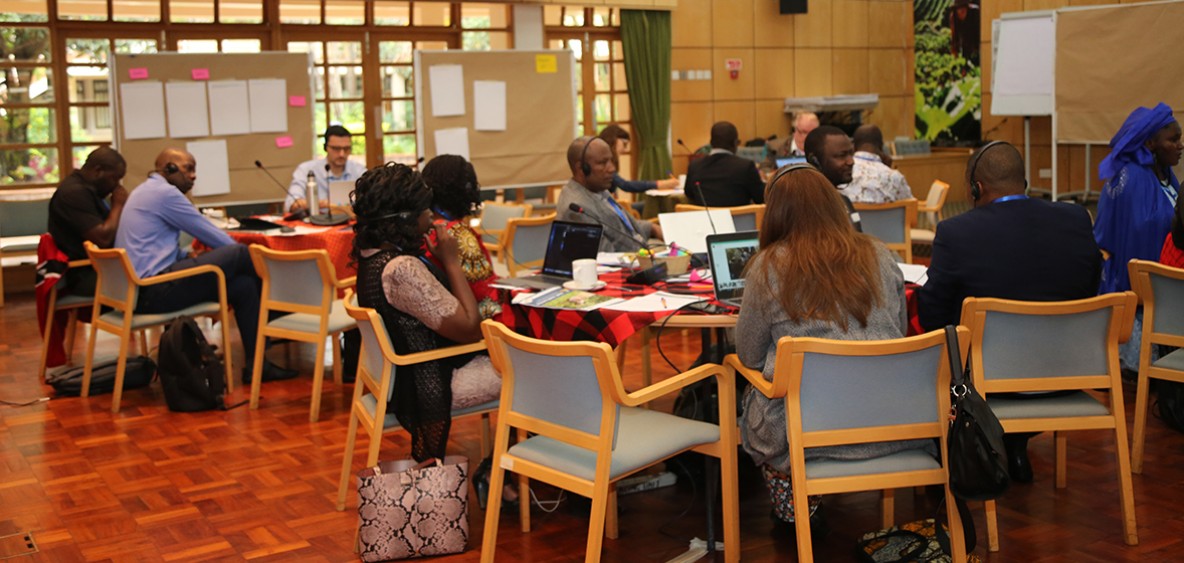
Despite the challenges and project delays caused by Covid-19, this year’s virtual country roundtable event highlighted the considerable strides RFS country projects have made in building the resilience of smallholder farming communities in sub-Saharan Africa.
Solutions to challenges are a joint effort: when people are able to work together and share knowledge and expertise, they discover more quickly what works and what doesn’t. At the two-day virtual country roundtable event in September, 74 RFS participants were given the opportunity to do just that - to share their challenges, successes and lessons learned during the past year.
Country roundtable events are useful platforms where RFS project coordinators, Regional Hub partners and implementing agents from the 12 targeted countries come together to exchange ideas, knowledge, and best practices. The participants learn valuable lessons by listening to their counterparts’ accounts of project achievements and challenges.
During the two-day roundtable event, the project coordinators from each country shared the challenges they faced due to Covid-19. They also discussed their approaches to gender mainstreaming, and their experiences involving the local community in every step of the project.
Project coordinators from all the country projects gave account of significant project delays due to lockdown regulations. Because people’s movements were restricted, the much-needed monitoring, technical support, training and in-person community meetings temporarily came to a halt.
David Oruka, Project Manager for FAO- and UNDP-supported Uganda project, told participants that large formal meetings are still not allowed, and project activities have slowed down significantly. It is also difficult to introduce online meetings because internet connectivity in Uganda is limited and data is expensive. “Farmers can go to their gardens, but marketing activities are limited by the curfew and movement restrictions,” said David.
In Ethiopia, all workshops, review discussions and meetings were cancelled for the first six months since the outbreak of Covid-19. “Technical support decreased by 50% and the delivery (of project targets) were delayed in most districts,” said Birara Chekol, Project Coordinator for the UNDP-supported Ethiopia project.
The outbreak of Covid-19 in Nigeria meant representatives from the UNDP-implemented project could not travel to the country to train the newly established multi-stakeholder advocacy platform, Project Coordinator Rhoda Dia said during her presentation.
In Eswatini, markets were disrupted following the outbreak of Covid-19 when the government restricted movement. Smallholder farmers could not sell their products at markets, which created cashflow problems. Some of them found it difficult to buy seed or fertiliser, which hampered production for the next season. As Lynn Kota, Project Coordinator of the IFAD-implemented project, notes, “It has also been quite difficult to provide much-needed coaching and mentoring of farmers to realise increased yields.”
Each of the country projects have their own approach to incorporate gender considerations into the various components of the RFS programme. But there is one common goal: empower women economically and thereby improve the financial resilience of the entire community.
In Ghana, the World Bank-supported Sustainable Land and Water Management Project in the northern parts of the country has a strong focus on improving the livelihoods of women. Shea nut and cassava processing facilities were established to help women generate incomes for their households. “Women are encouraged to participate in discussions at the community level and they help identify environmental challenges. The active participation of women leads to effective implementation (of projects),” said Isaac Charles Acquah Jnr, Project Coordinator.
In Burkina Faso, the IFAD-supported Neer-Tamba project helped build the capacity of 4 224 women in manufacturing non-timber forests products, and in Uganda, Burundi, Eswatini, Ethiopia, Malawi, Senegal and Nigeria, beekeeping has created alternative incomes for women.
In Nigeria, beekeeping is such a success that it has the potential to become the main source of income for some households. “Women now have an income of their own and they are paying school fees and taking up financial roles in their communities,” said Rhoda.
At the core of the RFS programme are collaboration and partnerships between civil society, governments, NGOs, research institutions and the private sector. But the most important stakeholders are the local community themselves.
All the country coordinators emphasised in their presentations that a project’s long-term success depends on the local community’s buy-in. Their involvement in decision-making right from the design phase to the implementation and monitoring stages is essential for the projects’ successes.
Sidbewindin Simon Kabore, Environmental Monitoring Officer for Burkina Faso, said the RFS project is successful precisely because of collaboration across different stakeholders and community ownership. “The collaboration is backed by the networks and partnerships, and it helped that implementation agreements were signed with each of the partners.”
Joseph Kihaule, the National Project Coordinator for the IFAD-implemented Tanzania project, emphasised the importance of developing community action plans during the project planning process. “This means the communities take ownership of the planning, the mapping and the use of their natural resources.”
In Eswatini, local people from the community serve on Natural Resource Management Committees and act as project facilitators. This ensures that skills and knowledge are transferred to communities and guarantees the viability of the project.
The country experiences shared during the virtual roundtable illustrate that resilience is grown from the ground up: incorporating local communities in projects has been a crucial part of the RFS programme, and the success of this model has been repeated in country after country.
Acknowledging the importance of women has further empowered communities, proving that gender equality is not just a catchphrase, but a crucial aspect of building resilience within communities.
The next workshop in the 2021 Annual Workshop Series built on this lesson, led by gender-specialist, Ana Maria Paez Valencia, the workshop explored country experiences in gender-responsive project implementation within the RFS programme. If you missed the workshop, you can watch the event recording or stay tuned for further updates from the annual workshop series.
Keep an eye out for these upcoming events
Subscribe to our monthly newsletter to receive updates on stories directly from the field across all our projects, upcoming events, new resources, and more.